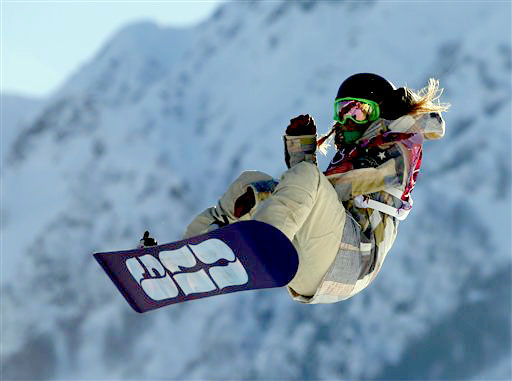CARLSBORG –– With the help of 209 people in Carlsborg, American snowboarder and gold medal favorite Jamie Anderson passed the qualifying round on the treacherous slopestyle course at the Rosa Khutor Extreme Park in Sochi, Russia, early Thursday morning PST.
“When does she ride? Is that 2 tomorrow morning or was that 2 this morning?” Mervin Manufacturing Inc.’s co-founder Mike Olson asked Thursday while trying to figure out the time difference in the factory’s nerve center at 155 Business Park Loop.
Atop a GNU Ladies Choice board made in Mervin’s 50,000-square-foot production facility, Anderson, 24, advanced to Sunday’s finals in slopestyle snowboarding at the 2014 Winter Olympics.
The athlete from South Lake Tahoe was one of the top eight qualifiers who will skip Sunday morning’s semifinals and advance straight to the Sunday afternoon finals, according to The Denver Post.
Australian Torah Bright also made the cut on a Roxy board, another brand made by Mervin, which has been running its plant in Carlsborg since 1996.
Riders on Mervin’s line of snowboards — Roxy, GNU and Lib Tech — will compete throughout the Sochi Olympics, which officially opens today and runs through
Feb. 23.
“It’s great. Every time one of our riders gets a medal, we’ve got this giant billboard on TV,” Olson said.
Other Mervin riders on the American Olympics team include Ty Walker and Kaitlyn Farrington.
Although equipment manufacturers are not allowed to advertise their Olympics connections, riders must use equipment that can be purchased by anyone.
That means the same boards Olympians flash to the cameras during half-pipe jumps and medal stand ceremonies are available now.
“But we don’t really see much of a boost from the Olympics,” Olson said. “This business is pretty well dependent on one thing: snow.”
Olympic snowboarders have been earning Olympics medals on Mervin’s boards since Danny Kass rode to a silver medal in the 2002 Winter Olympics in Salt Lake City.
In the 2006 Olympics in Turino, Italy, three of six medals went to riders of Mervin boards.
The company’s handmade boards are popular around the world.
Norm Nelson, the company’s efficiency and environmental expert at Carlsborg, said nearly one-third of the company’s boards are sold in European markets. Another 10 percent of its boards are exported to Japan.
“We’re pretty popular around the world,” Nelson said.
Supplying that demand keeps workers going pretty much around the clock.
The factory runs two 10-hour shifts daily, producing more than 500 boards a day.
Each board, from the wood to the fiberglass mesh to the polyethylene top and bottom design pieces, is drawn up and cut out by advanced computer-driven saws, printers and punches.
Then, the factory’s many workers assemble the pieces, rough off the edges and inspect each board by hand.
Nelson said the process is made easier by having it all on one site, at “the snowboarding-making capital of America,” instead of outsourcing phases of production offshore.
“It’s the difference between ordering out your food and growing your own,” Nelson said.
“We know what we’re getting, and we have the ability to control how we get it.”
That even goes down to getting rid of excess pieces: Nelson said the factory sends 7 tons of plastic out to be recycled every month.
The factory has proved profitable.
Last year, with sales at about $32 million, Mervin turned a profit of $7 million, Olson said.
Mervin Manufacturing is owned by Extreme Holdings, part of a private equity firm based in San Francisco. Surf apparel company Quicksilver sold it in November.
Olson started the company with Pete Saari in a barn outside Tacoma in 1977.
________
Sequim-Dungeness Valley Editor Joe Smillie can be reached at 360-681-2390, ext. 5052, or at jsmillie@peninsuladailynews.com.

